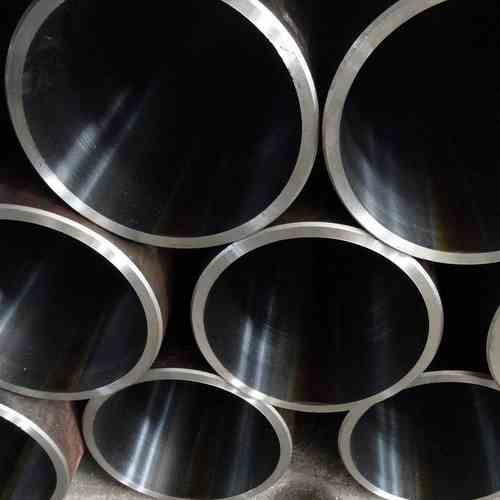Hydraulic cylinder tube is an essential component in hydraulic systems. They are used to create linear motion and force in hydraulic cylinders. The selection of the right material for hydraulic cylinder tubes is crucial in ensuring the optimal performance of hydraulic systems. Hydraulic cylinder tube usually is honed tube, which is a steel tube with inner diameter honed or skived & roller burnished. Hydraulic cylinder tube is known as hydraulic cylinder barrel also.
The materials commonly used for hydraulic cylinder tubes are:
- Carbon steel
- Stainless steel
- Alloy steel
- Aluminum
- Brass
- Copper
- Titanium
- Nickel alloys
In this article, we will introduce the most popular materials for hydraulic cylinder tubes, with a particular focus on two specific steel grades.
1. Carbon Steel:
Carbon steel is the most commonly used material for hydraulic cylinder tubes. It is a versatile material that is readily available and has good mechanical properties. Carbon steel hydraulic cylinder tubes are made from seamless tubes that are cold-drawn and heat-treated to achieve the desired strength and hardness. The most commonly used grades of carbon steel for hydraulic cylinder tubes are ST52.3, E355, SAE 1020 and SAE 1026.
Advantages:
– Good mechanical properties: Carbon steel has good tensile and yield strength, making it suitable for hydraulic cylinder tubes that require high-pressure resistance.
– Cost-effective: Carbon steel is an affordable material that is readily available, making it a popular choice for hydraulic cylinder tubes.
– Machinability: Carbon steel is easy to machine, making it easy to manufacture hydraulic cylinder tubes to precise specifications.
2. Alloy Steel
Alloy steel is a type of steel that contains additional elements such as chromium, nickel, and molybdenum. These elements improve the mechanical properties of the steel, making it stronger and more durable. Alloy steel hydraulic cylinder tubes are made from seamless tubes that are cold-drawn and heat-treated to achieve the desired strength and hardness. The most commonly used grades of alloy steel for hydraulic cylinder tubes are 4140 and 4130.
Advantages:
– High strength: Alloy steel has high tensile and yield strength, making it suitable for hydraulic cylinder tubes that require high-pressure resistance.
– Corrosion resistance: The additional elements in alloy steel improve its corrosion resistance, making it suitable for hydraulic cylinder tubes that are exposed to harsh environments.
– Wear resistance: Alloy steel has excellent wear resistance, making it suitable for hydraulic cylinder tubes that are subjected to high levels of wear and tear.
In conclusion, selecting the right material for hydraulic cylinder tubes is crucial in ensuring the optimal performance of hydraulic systems. Carbon steel and alloy steel are two of the most popular materials for hydraulic cylinder tubes. Carbon steel is a cost-effective and versatile material, while alloy steel offers high strength, corrosion resistance, and wear resistance. When selecting the material for hydraulic cylinder tubes, it is essential to consider the specific requirements of the hydraulic system to ensure that the material chosen can withstand the operating conditions.
